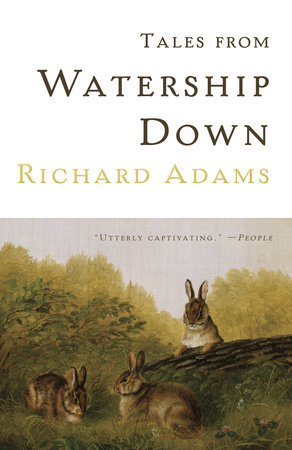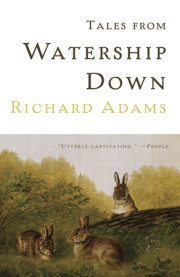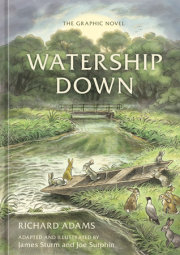1. The Sense of Smell
“…noses have they, but they smell not.”
—Psalm 115
“Who dares wins.”
—Motto of the special air service
“Tell us a story, Dandelion!”
It was a fine May evening of the spring following the defeat of General Woundwort and the Efrafans on Watership Down. Hazel and several of his veterans—those who had been with him ever since leaving Sandalford—were lying on the warm turf, full of grass and comfortably relaxed. Nearby, Kehaar was pecking among the low tussocks, not so much feeding as using up the day’s remains of his continual, relentless energy.
The rabbits had been chatting together, recalling some of their grand adventures of the previous year: how they had left the Sandleford warren under fiver’s warning of imminent disaster; how they had first come to Watership Down and dug their new warren, only to realize that there was not a single doe among them. Hazel had recalled the ill-judged raid on Nuthanger Farm, in which he had nearly lost his life. This had reminded several of them of their journey to the great river, and Bigwig had told yet again of the time he had spent in Efrafa as a supposed officer of General Woundwort; and how he had persuaded Hyzenthlay to form the group of does who had broken out in the thunderstorm. Blackberry had tried but could not explain his trick with the boat, which had enabled them to escape down the river. Bigwig, however, had refused to tell of his underground fight with General Woundwort, insisting that he wanted only to forget it; so instead, Dandelion had recounted how the Nuthanger dog, let loose by Hazel, had pursued him and Blackberry into the midst of the Efrafans gathered on the Down. He had hardly finished, when there arose the well-worn cry: “Tell us a story, Dandelion! Tell us a story!”
Dandelion did not respond immediately, seemingly reflecting as he nibbled the grass and took a few hops to a sunnier patch before settling himself again. At length he replied, “I think I’ll tell you a new story this evening; one that you’ve never heard before. It’s about one of the greatest of all adventurers of El-ahrairah.”
He paused, sitting up and rubbing his front paws over his nose. No one hurried the master storyteller, who appeared, by taking him time, to be rather relishing his standing among the group. A light breeze stirred the grass, and a lark, ending its song, dropped down near them, paused for a time and then began another ascent.
There was a time (said Dandelion), long ago, when rabbits had no sense of smell. They lived as they do now, but to have no sense of smell was a terrible disadvantage. Half the pleasure of a summer morning was lost to them, and they couldn’t pick out their food in the grass until they actually bit into it. Worst ofall, they couldn’t smell their enemies coming, and this meant that many rabbits fell victim to stoats and foxes.
Now, El-ahrairah perceived that although his rabbits had no sense of smell, their enemies and other creatures—even the birds—possessed it, and he determined that he would seek out that extra sense and win it for his people, whatever the cost. He began to seek advice everywhere he could, asking where the sense of smell was to be found. But no one knew, until at last he asked a very od, wise rabbit in his warren, named Heartsease.
“I can only recall that when I was young, “ said Heartsease, “our warren gave shelter to a wounded swallow—one who had traveled far and wide. He pitied us because we had no sense of smell, and he told us that the way to the sense of smell lies through a land of perpetual darkness, where it is guarded, he said, by a band of fierce and dangerous creatures known as the Ilips, who live in a cave. More than this he did not know.”
El-ahrairah thanked Heartsea and, after deliberating for a long time, when to see Prince Rainbow. He told him that he meant to go to that land and asked him for his advice.
“You had much better not attempt it, El-ahrairah,” said Prince Rainbow. “How do you think you are going to find your way through a land of perpetual darkness to a place you don’t know? Even I have never been there, and what’s more, I don’t intend ever to do so. You’ll only be throwing your life away.”
“It’s for my people,” replied El-ahrairah. “I’m not prepared to see them hunted down day after day for want of a sense of smell. Is there no advice you can give me?”
“Only this,” said Prince Rainbow. “Don’t tell anyone that you meet on your journey why you are going. There are some very strange creatures in that country, and if it were to become known that you had no sense of smell. It might well be the worse for you. Invent some purpose. Wait—I’ll give you this astral collar to wear around your neck. It was a gift to me from Lord Frith. It may just possibly help you.”
El-ahrairah thanked Prince Rainbow, and the next day he set out. When at length he came to the border of the land of perpetual darkness, he found that it began with twilight, which deepened until all around was dark. He could not tell which wa to go, and what was worse, he could form no sense of direction, so that for all he knew, he might be going in circles. He could hear other creatures moving in the dark around him, and as far as he could tell, they seemed to know what they were doing. But were they friendly. And would it be safe to talk to any of them? At last, in sheer desperation, he sat down in the dark and waited in silence until he heard come creature moving nearby. Then he said, “I’m lost and confused. Can you help me?”
He heard the creature stop, and after a few moments it replied in a strange but just understandable tongue. “Why are you lost? Where have you come from and where do you want to go?”
“I’ve come from a land where they have daylight,” answered El-ahrairah, “and I’m lost because I can’t see and I’m not used to this darkness.”
“But can’t you smell your way? We all can.”
El-ahrairah was about to answer that he had no sense of smell, but then he remembered Prince Rainbow’s warning. So he said, “I’m afraid the smells are all different here. They only confuse me.”
“So you’ve no idea what sort of creature I am, for instance?”
“Not the least. But you don’t seem fierce, that’s one blessing.”
El-ahrairah heard the creature sit down. After a little, it said, “I’m a glanbrin. Are there any where you come from?”
“No. I’m afraid I’ve never heard of a glanbrin. I’m a rabbit.”
“
I’ve never heard of a rabbit. Let me sniff you over.”
El-ahrairah kept as still as he could while the creature, which was furry and seemed to be about the same size as himself, sniffed him over carefully from head to foot. At last it said, “Well, you seem to be very much the same sort of animal as I am. You’re not a beast of pretty and you obviously have a very strong sense of hearing. What do you eat?”
“Grass.”
“There isn’t any here. Grass won’t grow in the dark. We eat roots. But I think you and I are very much alike. Don’t you want to have a sniff too?”
El-ahrairah pretended to sniff all over the glanbrin. In doing so, he found that it had no eyes; that is, what might have been its eyes were hard, small land sunken, almost lost in its head. But for all that, he thought, “Well, if this isn’t some sort of rabbit, then I’m a badger.” He said, “I don’t believe there’s anything much to choose between us, except that I…” He was about to say “can’t smell” but checked himself and finished, “that I’m utterly confused and lost in this darkness.”
Copyright © 2012 by Richard Adams. All rights reserved. No part of this excerpt may be reproduced or reprinted without permission in writing from the publisher.









